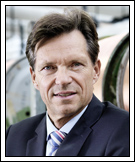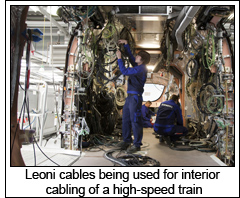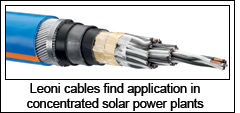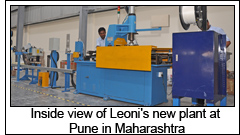 —Dr. Klaus Probst, CEO and President of Leoni AG
Leoni
—Dr. Klaus Probst, CEO and President of Leoni AG
Leoni is a global provider of cables and cable systems to the automotive sector and other industries. It recently its new plant near Pune, making it Leoni’s second production site in India after its engineering office and a manufacturing facility set up in 2010, also in Pune.
Dr. Klaus Probst talks about Leoni’s growth plans in the India. Probst believes that India’s demand for energy, renewable energy, transportation and infrastructure will continue for many years ahead, providing abundant growth opportunities. An interview by
Venugopal Pillai.
Tell us more on Leoni’s new plant in India. What products will you manufacture initially?
The new plant will produce a variety of cables and assembled cable systems for several industry branches. Serial production started at the beginning of 2013 with the manufacturing of standardised cables for the automotive industry. By the way, Leoni is the global market leader for single-core automotive cables with an annual output of almost 10 million kilometers.
During the coming months we will also ramp up the production of more complex products like automotive special cables. They are used for vehicle applications like data transmission, telematics, safety, control, comfort, power and sensor.
Who will be your key customers?
Though we cannot give names due to reasons of discretion, in the automotive segment we have approvals of several car manufacturers from different continents that will be supplied with our cables through wiring harness makers. Regarding the non-automotive sector, we are happy to have customers from the energy and the rolling-stock industries among others.
 How is the first wiring systems plant of Leoni at Pune faring? How has been the growth over the past year or so of its existence?
How is the first wiring systems plant of Leoni at Pune faring? How has been the growth over the past year or so of its existence?
We started our first Indian activity end of 2010 with a project for Tata Cummins. Leoni has been delivering diesel engine harnesses to the US-Indian joint venture. We can see a steady development and are looking forward to expanding our business also to other customers.
The new Pune plant, as we understand, will progressively make a diversity of cables, catering to sectors like renewable energy, oil & gas, railway apart from the automotive industry. Please elaborate on your plans.
India promises attractive medium- and long-term growth prospects for several of our targeted industrial markets. Obviously, it is a huge country with a growing need for energy. We believe that exhaustible raw materials like oil and gas cannot guarantee the development and prosperity of this country in the long run. That’s why the development of new technologies in the renewable energy sector and the implementation of these alternative power plants are so important. Fortunately, India has a good geographical predisposition for the usage of solar power stations. And we see a variety of activities and thus a rising demand for cables and cable systems in this field. Leoni offers a wide range of power and control cables for photovoltaic and solar power plants as well as wind turbines.
What about the rolling stock industry that you mentioned?
Yes, another huge field is the rolling-stock industry, which needs high quality cable systems. Modern high-speed trains contain more and more electrical and electronic functionalities, which have to be connected. Nowadays, the internal wiring consists of a sophisticated system of halogen free flame retardant control and power cables that run along the trains’ floor, roof and sidewalls. The outside of the trains also needs high quality cabling: We develop and deliver ready assembled, high voltage systems including connectors and fixings, which will carry the electrical power across the cars along the so-called jumpers.
 We hear of very sophisticated technology to be deployed at the new Leoni plant.
We hear of very sophisticated technology to be deployed at the new Leoni plant.
Leoni plans to bring a very special technology to the new plant. We intend to install electron beam equipment at the latest by 2015, which permits us to manufacture very robust and durable cables used e.g. for solar and railway applications. The electron beam cross-linking process makes products, for example, more dimensionally stable when subjected to heat, more resistant to chemicals, solvents and temperature fluctuation as well as harder and more resistant to abrasion.
Last but not least, the new facility will make cables for critical applications in oil & gas, petrochemicals, power plants, water treatment and other process industries. Leoni plans to export a major portion of such products to other countries.
The overall India electrical equipment industry appears to be going through a rough patch with under-utilized capacity resulting from depressed demand and an onslaught of cheap imports. How do you see the overall trends?
We are looking at the markets from the long-term perspective. We understand that there have been short periods of negative development. However, these have been followed by periods of economic increase. Overall we have confidence in India’s long term growth. Also we believe that in India there is need for high technology, which also means high quality reliable cables and cable systems focused on the markets we are targeting.
We learn that globally Leoni makes power cables that are used in power distribution and building wiring. Do you have such plans in India?
Apart from the current activities, there are other business units in our company that are studying the opportunities in India. We will announce these plans at an appropriate time.
 India seems to be developing appetite for extra high-voltage cables for power sub-transmission and distribution. Is Leoni globally active in this area?
India seems to be developing appetite for extra high-voltage cables for power sub-transmission and distribution. Is Leoni globally active in this area?
Currently we focus on the low voltage and medium applications. Generally speaking, Leoni is predominantly serving niche markets with specific products instead of mass applications.
In general, how does India as a market compare with other emerging countries where Leoni operates? What would you regard as key characteristics that possibly make India an interesting market to pursue?
India has a vast economy with a diversified base. This gives possibilities for many of Leoni’s business units. The demand for energy, renewable energy, transportation and infrastructure will be there for many years. High quality educated manpower, language, legal and democratic structure make India an interesting market, too.
Going by your current plans, we see Leoni having a well diversified portfolio in the coming 3-4 years. What would you regard as your key business drivers then?
The key business drivers will be continued support by government to develop renewable energy, public transport especially for intra-city and intercity, infrastructure development as well as policies that will encourage more investments.
In the next 5-7 years or so, do you see India having a significant share in Leoni’s global portfolio?
Yes, we see an increasing share of Indian operations! As to the percentage of total turnover, the regional importance has been shifting away from Europe towards emerging markets like India for some years. In 2016, the share of the four BRIC countries together will amount to at least 20 per cent of our global sales.